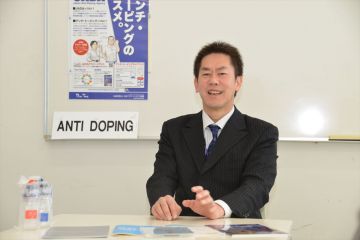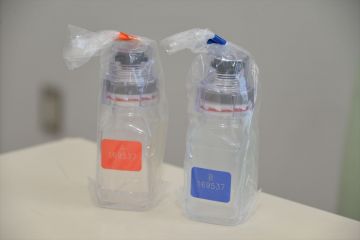TSUKUBA FUTURE
#035 Anti-Doping for Real Champions to Be Proud Of
Associate Professor WATANABE Koichi, Faculty of Health and Sport Sciences

We are moved and inspired by the sight of top-class highly trained athletes taking part in sports events grounded in the spirit of fair play, which is why people are hugely disappointed when they hear about allegations of drug use. The true meaning of sport is a fair fight, a culture shared by the entire world. However, enhancing performance through the use of drugs has unfortunately been lurking under the surface since long before attention was given to the doping problem. One disturbing incident took place at the Rome Olympics in 1960, when a Danish cyclist suspected of using amphetamines died during a race. This triggered an awareness of doping prevention in the world of sport.
In Japan, the issue of doping was discussed in public at an international conference held during the Tokyo Olympics in 1964. Following the establishment of the World Anti-Doping Agency (WADA) in 1999, the Japan Anti-Doping Agency (JADA) was established in 2001, enabling the development of global-standard anti-doping activities. Prof. Watanabe's interest in anti-doping goes back to 1988. Back when each sporting organization carried out its own doping tests, Watanabe, an undergraduate student of Physical Education at the University of Tokyo Faculty of Education, became involved in drug testing for swimming events. This piqued his interest in sports medicine, and led him to retrain as a doctor at the University of Tsukuba. He took part in the London Olympics in 2012 as the doctor to the Japanese swimming team.
Traditional drugs were body-building compounds and stimulants. In other cases, just before a race, athletes received a transfusion of their own blood which had been taken in advance and preserved. This increases the number of red corpuscles and is said to temporarily heighten cardiorespiratory capacity. These not only go against the spirit of fair play, they can also endanger the health of the athlete.
Following Tokyo's decision to bid for the Olympic and Paralympic Games in 2020, the University of Tsukuba formed a partnership agreement with JADA in November 2013. University President Kyosuke Nagata noted in his new year's message, "Our university, which is active in fields including physical education, sports medicine, and disability sciences, will proactively participate in promoting the Olympic Movement and in anti-doping activities through education and research, and will contribute as much as it can to the success of the 2020 Tokyo Olympics and Paralympics."


Urine sample bottles
Intentional doping is a separate issue, but education and awareness are very important tools for the prevention of unintentional or inadvertent doping. Ephedrine, a banned doping substance, can be found in ninety percent of over-the-counter medicines for the common cold. Hay fever medication and supplements should also be checked carefully. If an athlete tests positive for doping, the excuse "I didn't know" will not work. An athlete must take care when offered beverages from unknown sources. Education is essential for preventing so-called "accidental doping," as is ethical guidance to avoid temptation. Anti-doping is one of the rules which must be followed if one wishes to participate in sporting events. It is also essential to train doctors and pharmacists in anti-doping. Anti-doping is covered during authorized sports doctor and athletic trainer education programs in which Prof. Watanabe takes an active part. Over 5,000 JADA-approved sports pharmacists all of whom are trained in anti-doping, are listed on the JADA website.
Drug tests are not pleasant for the athlete. For a urine test, the urine sample is collected under direct observation of a witness. Furthermore, many top athletes are selected for RTPA (Registered Test Pool Athlete) listing, meaning they are obliged to submit to offsite testing without prior notice, for which testers may visit the athlete at home unannounced. In addition, once a quarter athletes must report where they intend to be over the following three months, and failure to report changes in plans carries a penalty. However, selection for RTPA listing carries with it the honor of being an athlete of true national status.
Against the backdrop of the success of the bid to hold the Olympics and Paralympics in Tokyo, Japan has become more proactive than ever in the field of anti-doping. It is said that Japan's virtually clean record in the Olympics and Paralympics was a crucial factor in the bidding process. The University of Tsukuba, with its affiliated schools and sports medicine experts, is in prime position to trial an education system for anti-doping, sports ethics for the present generation of sportspeople, and sports management. Linking up with JADA, Prof. Watanabe is working to nurture a healthy sporting culture.
Article by Science Communicator at the Office of Public Relations


